Dear Friends and Neighbors,
I hope you are able to enjoy a restful and joyous holiday season. I’m looking forward to spending down time with loved ones and recharging for the 2024 legislative session which is right around the corner. I head back to Olympia on January 8th and I want to hear from you! Read on to learn the best ways to communicate with my office, follow the progress of legislation, watch committee hearings, and learn about bills I will introduce.
Staying Informed and Getting In Touch
Part of crafting legislation that reflects our shared values is having open lines of communication. That starts with hearing from you! I look forward to hosting you in Olympia, meeting virtually, and connecting in the district. You can email me here. If you would like to comment on specific legislation, you can sign up to testify for a committee hearing or submit written testimony here. If you would like to simply register your position, you can also sign in as in support or opposed to a bill without providing testimony. All committees in the Legislature offer remote testimony, so you do not have to come down to Olympia to testify.
To learn more about the legislative process from start to finish, visit the Legislature’s homepage. You can also look up bills by topic or lawmaker. Tune into TVW.org for broadcasts of debates, votes, committee meetings, and other events in the House and Senate. There’s also an extensive archive of past events if you missed watching a live committee hearing or floor debate.
I will also proactively keep you informed of what’s going on in Olympia through these newsletters, my website (housedemocrats.wa.gov/street), and my legislative Facebook, (facebook.com/RepChipaloStreet).
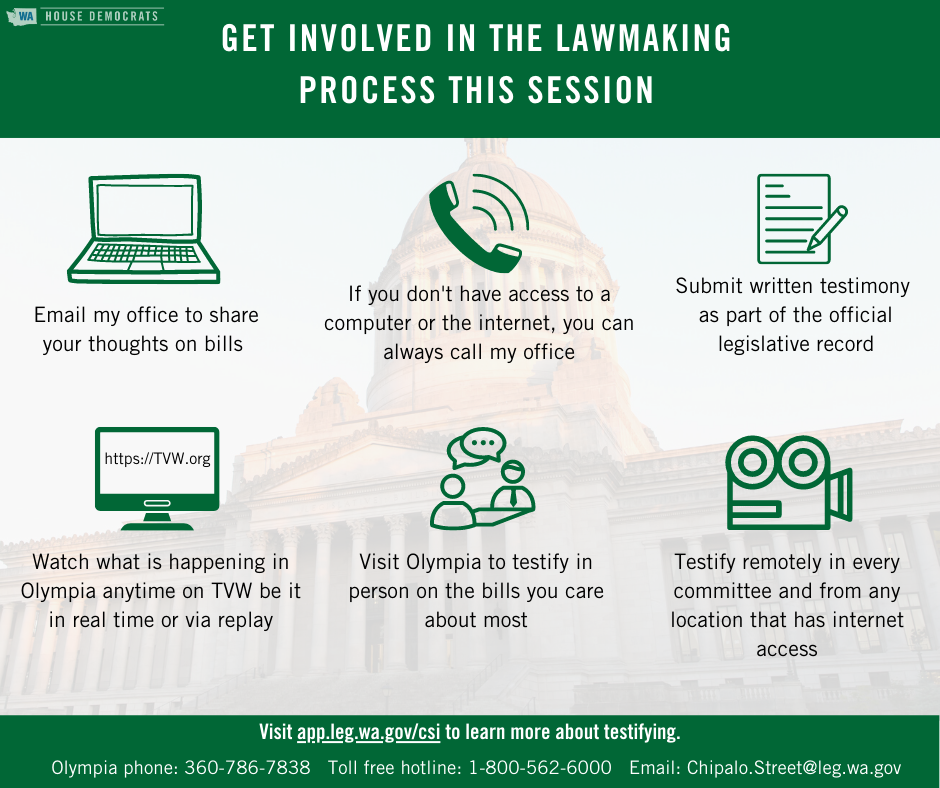
My Bills for the 2024 Session
I’ll be introducing a slate of bills for the 2024 session. Some of them are small, yet important, like ensuring Harborview has the funds to complete renovations or closing loopholes that prevent affordable housing nonprofits from receiving tax exemptions. Others are meant to help build movements, like urging our federal delegation to have our country join the fossil fuel non-proliferation treaty. Here are summaries of a few of the more complex bills I’ll be working on this coming legislative session.
Recycling EV Batteries
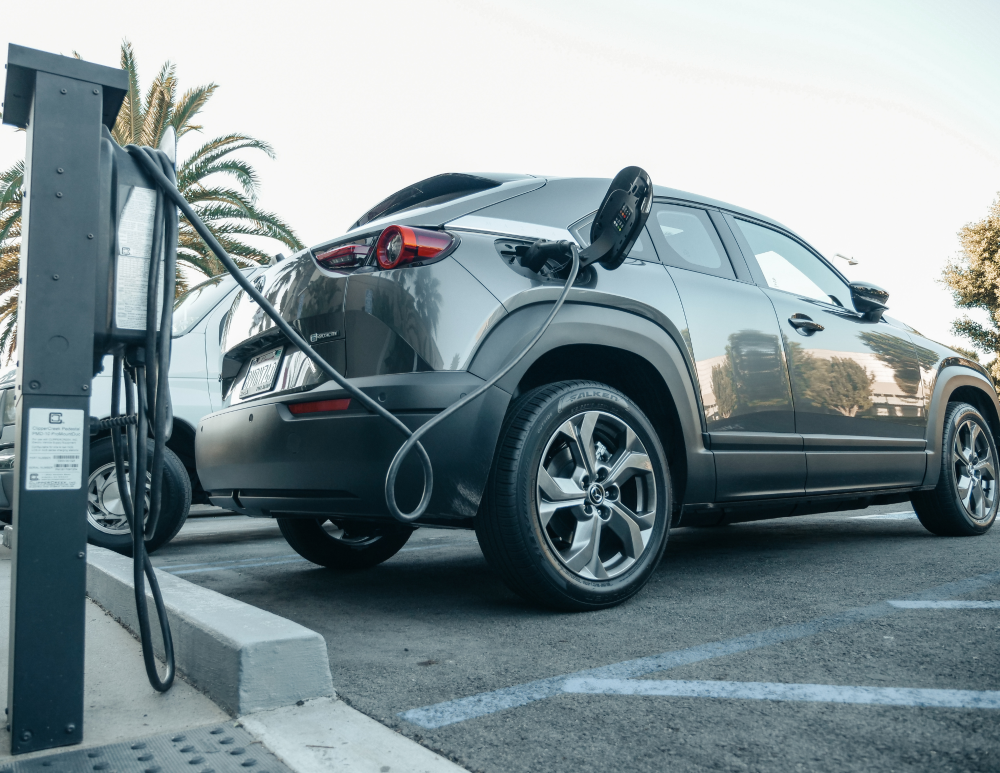
Part of averting our climate disaster is electrifying our economy. That will cause batteries to further proliferate, and they are not without their own environmental costs. Getting the materials to create batteries is carbon intensive, from the mining of the materials to the manufacturing process and supply chain necessary to get the battery where it needs to be. At the end of a battery’s life cycle, they can create fires in our dumps and leech toxic chemicals. Last year, I helped pass SB 5144/HB 1533, to create a battery recycling program in Washington. The new program requires battery producers to participate in a stewardship organization that plans and provides for battery collection and environmentally responsible end-of-life management. Another part of SB 5144 directed the Department of Ecology to study the best ways to recycle electric vehicle batteries and large format batteries.
As our state transitions from gas to electric vehicles, disposing of and recycling the batteries from EVs, which can weigh around 1,000 pounds, will be extremely important. This year I will be working with Senator Stanford, the Department of Ecology, and Zero Waste Washington on a bill to create an EV battery recycling program similar to the program created with SB 5144 for regular batteries. Not only will this help protect our environment from old or improperly maintained EV batteries, but it will ensure that the valuable resources in those batteries are not wasted. We can protect our environment from toxic chemicals and create a system that lessens the environmental impact of EV batteries if we start designing this recycling system now. This problem will only accelerate, so it is important that we get to work.
Making the Estate Tax More Progressive

Washington has one of the most regressive tax codes in the entire nation. There are many things We need to do to rebalance our tax code so that those who can least afford to pay taxes are not unfairly burdened. Bringing an income tax to our state would allow us to reduce some of the most regressive taxes: sales and property tax. We’ll push for other forms of progressive taxation until that happens. Other Democrats have introduced a wealth tax and real-estate transfer tax. I have a bill to make our estate tax more progressive.
Many Washingtonians are fortunate enough to have multimillion dollar estates after paying for funeral expenses and taking exemptions. By making the estate tax more progressive, we can ensure that all Washingtonians contribute similar percentages of their wealth towards sustaining the vibrancy of our state. My bill, HB 1795, will do that by making small changes to the exclusion amount, deductions, and rate structure of the estate tax. I look forward to working with my colleagues on the Finance Committee to pass this policy to make our state a little fairer.
Traffic Safety for All
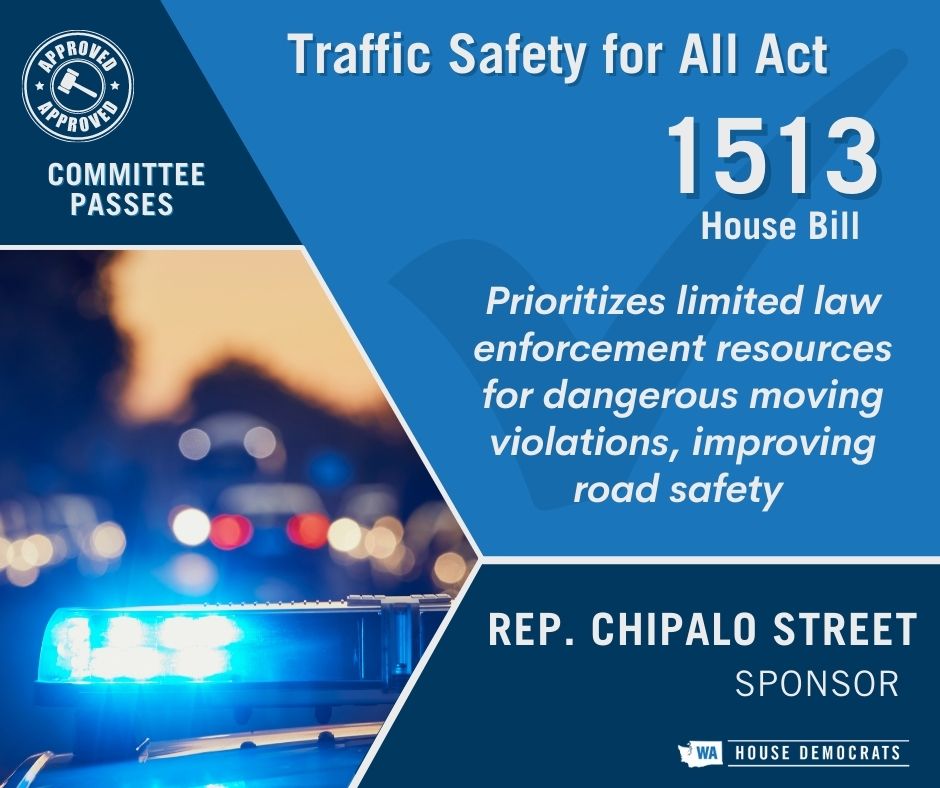
Washington is experiencing a record high number of traffic deaths and yet too much of our policing is focused on non-moving violations that have no impact on road safety. Stops for non-moving violations disproportionately impact low-income communities, do little to improve public safety, and harm community-police relations. My bill, HB 1513, will improve road and public safety by helping motorists fix equipment issues and reprioritize police time from low-risk traffic stops to safety-related stops. The Traffic Safety for All Act will allow us to focus our resources on getting dangerous drivers off the road and not creating situations that can spiral out of control.
Making sure that everyone’s car is in the best operating condition is the first step toward reducing traffic stops. This bill lays the foundation for a system that would help low-income drivers avoid fines by creating a pool of grant money for cities, counties, tribes, and non-profits to create pilot programs that improve vehicle safety. The money could be used for repair vouchers, taillight installation workshops, fee waivers for expired tabs, helmet vouchers, and other programs that would improve road safety.
Police are here to make our community safe. Data from the Washington Traffic Safety Commission shows that traffic enforcement of moving violations increases public safety.
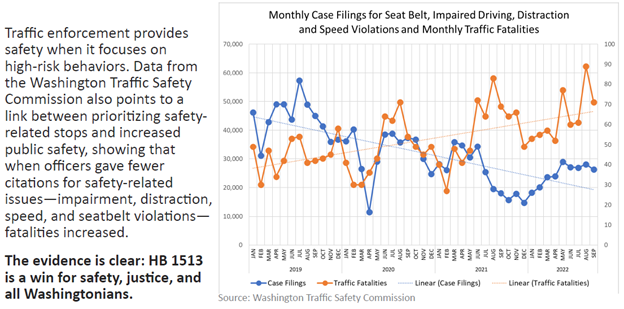
Fatalities increased when officers gave fewer citations for these issues—impairment, distraction, speed, and seatbelt violations. This is where our police officers’ valuable time should be spent, not on low-risk traffic stops that the NYU School of Law’s Policing Project study determined are “not an effective strategy for reducing crime.”
Reprioritizing the types of traffic stops police officers make not only improves public safety, it also combats racial inequities. An analysis of high discretion searches by the Washington State Patrol found that troopers searched Black, Hispanic, and Pacific Islander drivers at roughly twice the rate of white drivers despite finding contraband at a lower rate than white drivers. The numbers were even starker for Native Americans who were searched at five times the rate of white drivers.
The Traffic Safety for All Act prevents officers from making traffic stops for non-moving violations. It also ensures safety-related stops focus on the issue for which the driver was originally stopped by only allowing searches of the driver and passengers if there is reasonable suspicion of a more serious crime, such as the smell of alcohol or visible contraband. Fewer forced interactions with police, and clear reasons for these stops, will reduce incidents that escalate to tragic uses of force.
Meet My Legislative Assistant Travis
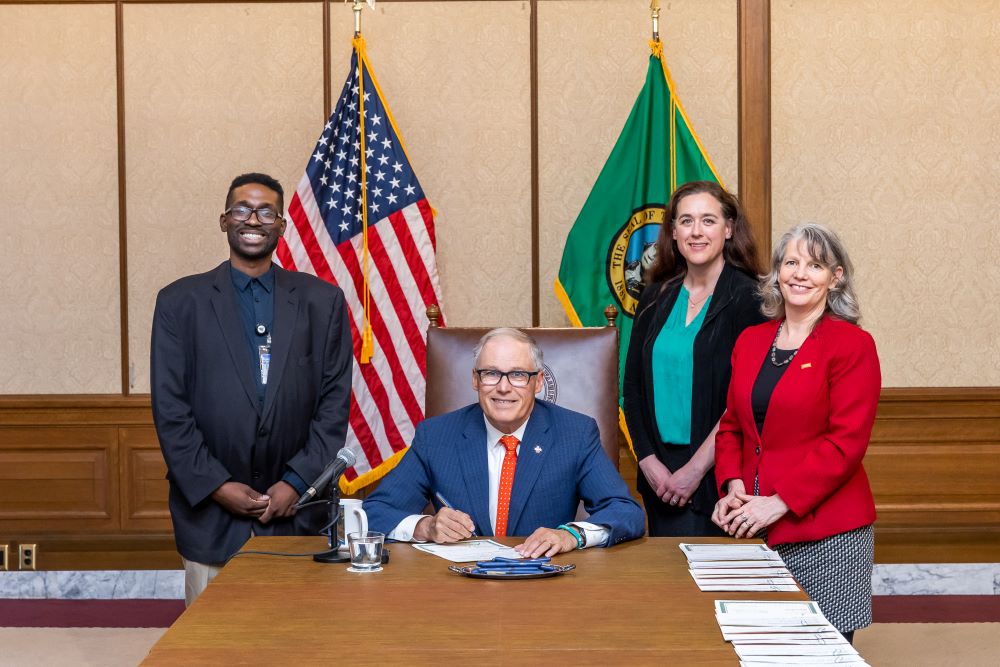
If you’ve called my office or scheduled a meeting, chances are you will get a chance to talk to my legislative assistant, Travis Jones. Legislative Assistants are the backbone of the Legislature: tracking bills, scheduling meetings, convening stakeholders, responding to constituent correspondence, and, in general, keeping the office running.
Travis was raised in New Orleans by his mother, a cancer survivor. After graduating with a degree in Political Science from the University of New Orleans, Travis made his way to the Pacific Northwest where he served as the campaign manager for my first campaign. As someone who has always been active in various community groups, working to connect residents from the 37th District with their government is a natural fit. His passion for serving his new community in the South End has made him a valuable member of my team. Say hi to Travis next time you are in Olympia or if you call and schedule a virtual meeting!
Thank you for reading my e-newsletter. Hearing from you is the most important part of representing you. I hope you will share your thoughts, ideas, and opinions with me.
Sincerely,

Chipalo Street
State Representative
37th District
